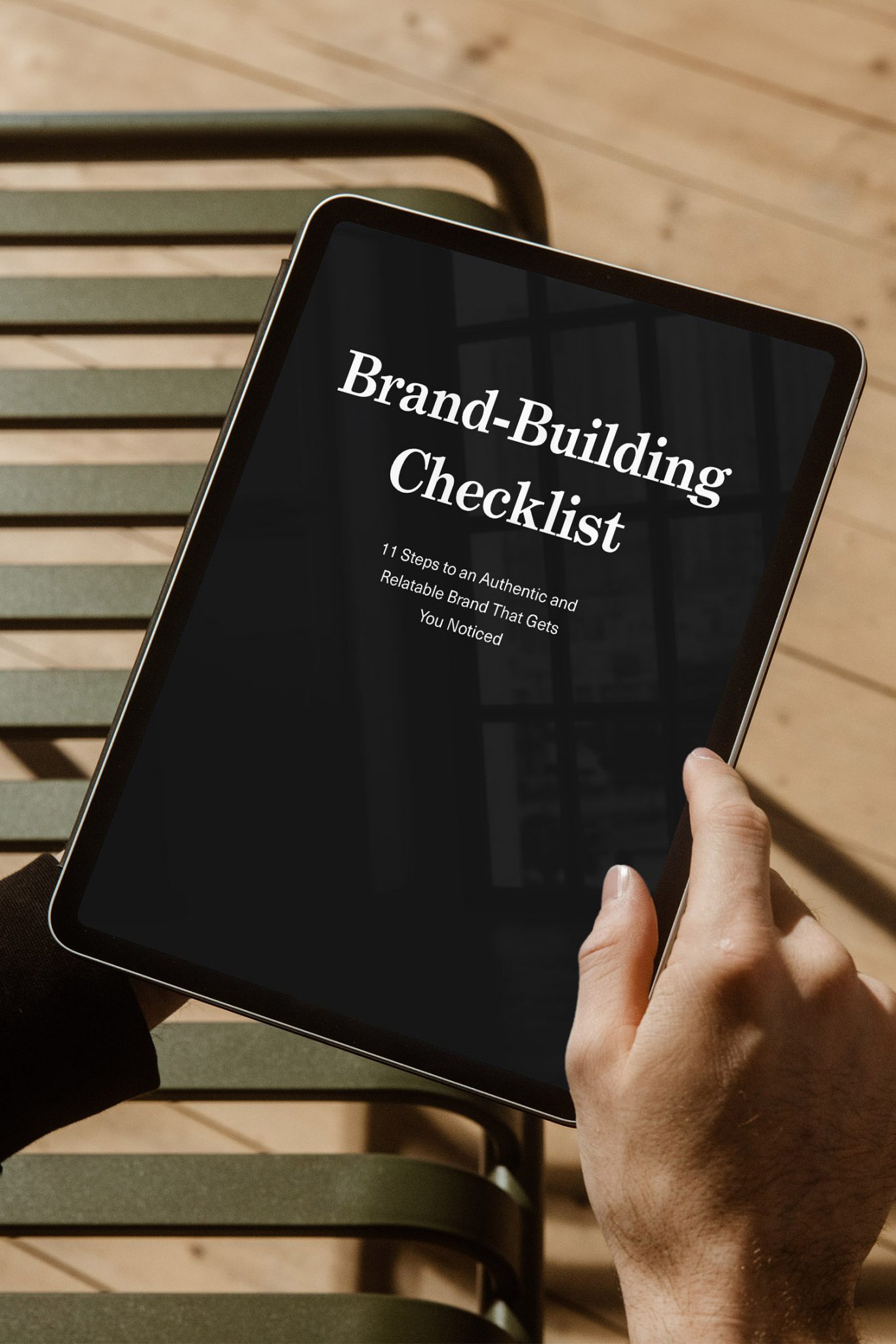Surely, as an entrepreneur, you’ve wondered, “When should I start branding my business?” While there’s no definitive answer, one thing is certain: branding happens from day one, whether you plan it or not. So, technically, the best time for branding is now.
Today, a strong brand is important for any business—no matter its size or industry. The sooner you start thinking about your branding, the better. However, not every small business has the resources and capacity for professional branding from the start. Fair enough.
In this article, we’ll look at two scenarios for when branding might be tackled. But before we get into that, let’s agree on what we mean by “branding.”
What Do I Mean by Branding?
Branding is about actively shaping how people perceive and experience your company.
To do this, you need to understand your company’s internal factors, target audience, and market. Based on this, you can define your unique positioning and brand personality, and translate those into a brand identity that resonates with people and sets your company apart.
We should also distinguish between DIY branding and professional branding. The former you might do yourself, or you might hire a graphic designer for a simple logo or a few graphics. With the latter, you hire a freelancer or branding agency to guide you through a comprehensive branding process—including tone of voice, messaging, and your overall brand strategy.
Branding Before Launch
Many entrepreneurs choose to invest in professional branding even before launching their business. This allows them to create a consistent and professional impression right from the start.
Emily Heyward, founder of the renowned branding agency Red Antler, advocates for pre-launch branding. She has worked with successful brands like Allbirds and Casper. In her book, Obsessed, she emphasises that companies must have a strong brand from day one:
As category after category gets disrupted, as competition gets fiercer, it’s no longer enough to have a great idea, or a better price, or faster shipping. Founders need to be thinking about brand from before day one; it needs to be embedded in their culture from the very start. They need to build a brand that people will fall madly in love with at first sight, and they need to do it before they even launch.
—Emily Heyward
I agree with her that pre-launch branding can be very effective. The success stories of many Red Antler clients, including Hinge, Prose, and Judy, prove this.
By investing in their branding early on, these companies could establish a clear position in the marketplace, build a strong identity, connect with their audience, and stand out from the first day.
That said, pre-launch branding isn’t for every business. It takes a lot of work, research, and financial investment to get it right. Given that 50% of small businesses fail in their first five years, this strategy can be risky.
For smaller businesses, a more flexible approach that allows them to develop their brand gradually over time could make sense.
But even if you don’t invest in professional branding right away, it’s still important to communicate consistently and use visual elements repeatedly. A consistent identity can help build customer trust and create recognition, even on a limited budget.
Pros and Cons of Branding Before Launch
Pros
- Generates customer excitement and interest through engaging storytelling, design, and messaging.
- Ensures a recognisable, cohesive brand identity.
- Makes marketing more effective with a clear link back to the brand (through the consistent identity).
- Increases trust in the brand.
- Increases the perceived value of the offer (see pricing and brand perception).
- Sets the brand apart from others and shows its uniqueness.
Cons
- Requires significant resources and business experience.
- Risky given the high failure rate of new businesses.
- Limits the company’s ability to adapt in the early stages.
- Sets high expectations from consumers that new companies with limited resources may find difficult to meet.
Who Can Benefit from Pre-Launch Branding?
Innovative startups
By investing in branding before launch, innovative startups can generate excitement and hype for their unconventional offers. Strong branding can position them as pioneers and appeal to early adopters.
Direct-to-Consumer (D2C) Brands
D2C companies, especially in e-commerce, thrive on an emotional connection with their audience. Pre-launch branding allows them to build loyalty, trust and a consistent customer experience from the outset.
For companies selling physical products, branded packaging design is another factor that benefits from early branding.
Branding After Launch
As a small business owner with a limited budget, you may have other priorities like product development, funding or marketing. I understand that investing in branding may not be your top priority at this stage.
But keep in mind, people will form an opinion about your business right from the moment it goes public. So, you’re automatically “branding” whether you intend to or not.
Every interaction and every type of communication affects how people perceive your brand.
While you may not have the resources for a professional branding process before launch, and may not have everything figured out yet, you shouldn’t neglect your brand completely.
Even in the early stages of developing your business, it’s important to establish some basic brand elements, such as a consistent typography, colour palette and brand voice. Over time, these elements can become ingrained in people’s minds and make the brand recognisable and trustworthy.
Later in the professional branding process, it is possible to adjust your brand elements if it makes sense strategically. This is not the ideal way, but not impossible either.
It’s wise to be clear about your company’s values and beliefs early on as they help build a bond between your band and its audience.
It might also be a good idea to tie the initial communication to your personal brand and simply take people along on your business and branding journey. That way, you can build an authentic connection from the start without having to have everything figured out.
64% of consumers say that sharing the same values with a brand is the primary reason they have a relationship in the first place.
— Harvard Business Review
A Success Story from Deliciously Ella
Deliciously Ella shows it’s possible to build a strong brand over time by staying true to your values and engaging with your audience.
Ella Mills began as a food blogger, documenting her journey of improving her health through a vegan diet. Her blog quickly gained popularity and expanded into a cookbook that became a bestseller in the UK.
Since then, the business has grown into a restaurant, several published books, a huge range of products and a wellness app.
Throughout her journey, Ella has maintained a brand identity centred around her personal story, values and mission to promote healthier living. She also used social media and her blog to connect with her audience and build a community around her brand.
By taking her audience along on her journey, Ella has built a loyal following and established herself as a leading voice in the wellness industry. And her branding has evolved step by step.
Let’s take a look at an older version of her website and the current one.


Pros and Cons of Branding After Launch
Pros
- Branding can build on real-world insights and customer feedback.
- Leaves flexibility to adapt to changing market trends and customer preferences.
- Remains flexible for business changes in the early stages.
Cons
- It’s more challenging to build initial excitement and brand recognition.
- The communication can get confusing due to a lack of direction.
- Re-branding later and changing existing customer perceptions will be difficult and risks losing some customers.
- It’s harder to build brand awareness without a clear identity and direction.
Who Can Benefit from Post-Launch Branding?
Businesses That Revolve Around a Person
Small businesses centred around the founder could initially build on the founder’s personal brand. Professional branding can take place later when the offer, identity, and audience are better established.
Experimental Startups
Some startups with experimental business models, for example in the digital sector, may opt for post-launch branding to refine their brand positioning based on real market feedback.
Business-to-Business (B2B) Brands
Companies that operate in the B2B space may opt for post-launch branding to align their brand identity with the actual needs and preferences of their customers.
6 Signs It’s Time for Professional Branding
1. Lack of Brand Awareness
When your target audience doesn’t know who your brand is or what it offers, branding can help improve awareness and shape people’s perceptions of your brand.
2. Difficulty attracting the right customers
If you’re struggling to attract the people you want to work with, it may be a sign that your positioning does not resonate with your target audience.
3. Difficulty Standing Out
When your company struggles to stand out from competitors, branding helps create distinctiveness.
4. Outdated or Unprofessional Communication
If your communication feels outdated or unprofessional, it can give the impression that your company is not up-to-date or capable. Branding will help align your brand with your expertise, audience and market trends.
5. The Brand Doesn’t Reflect Your Values and Personality
You want your brand to reflect your business’s values and personality. Branding can help bring this alignment.
6. Overwhelm With Business-Related Decision-Making
As an entrepreneur, you face numerous decisions daily, from finance to marketing to contracts. You may be surprised, but branding can help with decision-making by setting a clear focus.
As you can see, professional branding may become inevitable at some stage. However, I would never recommend making changes without a valid reason, because it takes time and effort to build trustworthy and distinctive brand assets.
Conclusion: When Is the Best Time for Branding?
In Conclusion, the best time for branding is before launching your business—whether you choose professional or DIY branding. As your company becomes visible, people will naturally form an opinion, making branding inevitable.
In saying that, the ideal timing for professional branding varies based on your offer, business model, experience, resources and goals. Some entrepreneurs choose to invest in branding before launch, while others opt for gradual brand development as they grow.
Whether you hire a professional or DIY your initial branding, remember to keep it consistent and reflective of your values and brand personality. Over time, your brand will naturally evolve and mature—either way.
If you need help with branding, let’s talk.
Title image by Kaboompics






